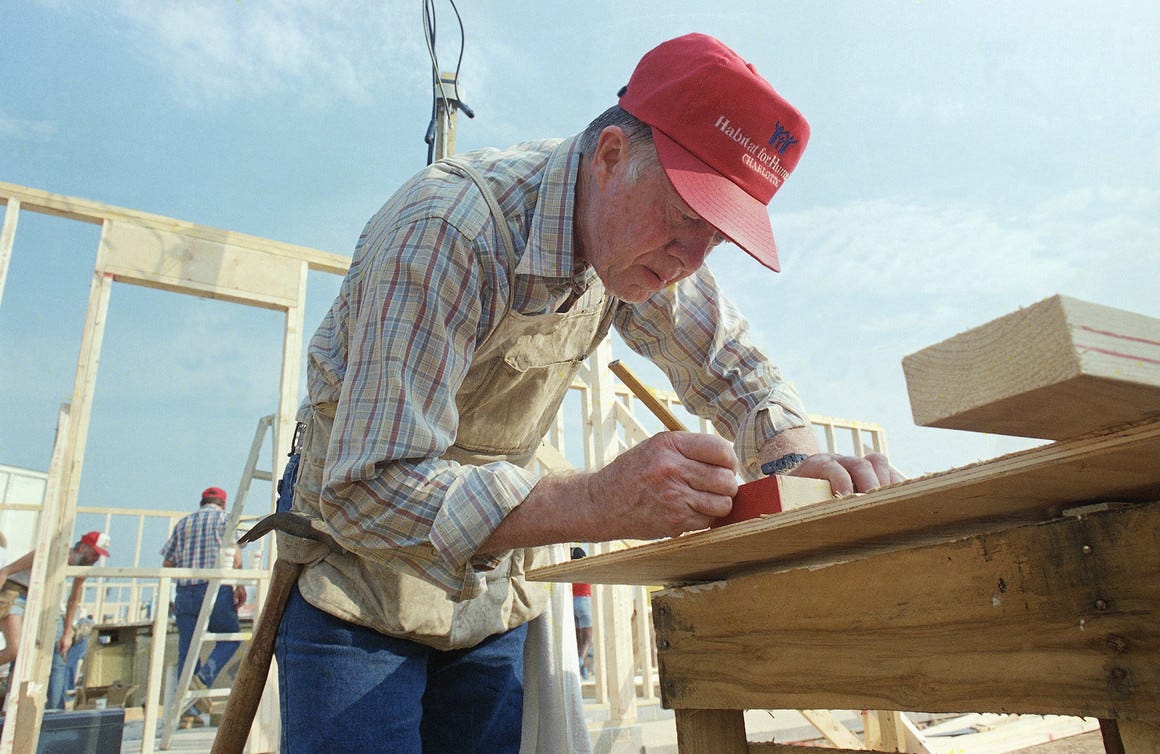I am pleased to feature a guest blog written by Don Akchin. Don has had a long, somewhat circular career as a writer. He began as a newspaper reporter, then moved into magazine writing and editing. He also served as a marketing executive for a college and a university, a communications consultant for a foundation, and for many years had his own business serving the communications needs of nonprofit organizations. Since leaving the working world seven years ago, he stays busy publishing a weekly newsletter and a biweekly news summary, all on the general topic of positive aging.
I first met Don in 2023 when he asked me to be a guest on his podcast called The EndGame: Aging with Joy and Purpose. We had a great discussion about retirement and how to plan and live this next stage of life.
A Model of Active “Retirement”
Jimmy Carter’s post-presidential career sets a sterling example.
The eulogies continue to pour in for former President Jimmy Carter after his death this week at
the age of 100. There were accolades for his achievements in political life, chief among them his
negotiation of the Camp David Accords that brought peace between Israel and Egypt, a rare
diplomatic triumph. The praises are well deserved, as is a more charitable reappraisal of his
Presidency.
Many have noted how Jimmy Carter led an exemplary life as a former President. To my mind,
Carter is also an exemplary model for how we can live once we conclude our primary careers.
Carter was only 56 years old in 1980, when Ronald Reagan’s election forced him into early
retirement. Becoming President of the United States is the summit of ambition for most
American politicians, and many former presidents have been to take a homerun trot and a bow,
giving occasional speeches and tending to their libraries. But for Jimmy Carter, it was not
enough to sit on his front porch and watch the peanuts grow.
Instead, he took his considerable energies in new directions. Citizen Carter became an
international peacemaker and a champion of human rights. The Carter Center, which Jimmy
and Rosalyn Carter established in 1982, mediated conflicts around the globe, observed 114
elections, and spearheaded successful efforts to eradicate Guinea worm disease, which
paralyzed tens of thousands throughout Africa and parts of Asia. In 2002 Carter was awarded
the Nobel Peace Prize.
For one week every year, Jimmy and Rosalyn Carter also volunteered to work on a Habitat for
Humanity project, building affordable homes for people in need (and elevating the visibility of a
worthwhile nonprofit organization). He also taught Sunday school weekly and found the time to
write more than 30 books.
Longevity
None of us knows how many years are ahead of us when we wrap up our primary careers.
Carter, it turns out, had 44 years to go – more than the 34 years he devoted to his naval and
political careers combined. We may not live to be 100, as he did. But with the advances in
health care and medicine that have added significantly to life expectancy, a post-career life of 20
to 30 years is highly probable.
Because of our likely longevity, the old concept of retirement, a word which suggests a
withdrawal, no longer applies. Even if we are tired of doing what we did for the previous 40
years, we’re too young to withdraw from life. Besides, 24/7 relaxation gets boring in a hurry. The
phrase “bored to death” is more than picturesque speech; it happens.
I don’t use the word “retirement” anymore, except to talk about what existed in the past. I prefer
to think of post-career life as The AfterWork, a term which suggests openness to multiple
possibilities. The AfterWork is an ideal opportunity to do something new, something creative,
perhaps even something brave. What better time could there be to take chances than when
failure doesn’t damage your reputation or destroy your standard of living? What better time to
reinvest energy in those passions you once held but never had time to pursue?
There are numerous possible ways to do this: Starting a business. Working part-time in a field
that is new to you. Picking up the piano or guitar or clarinet. Volunteering for a cause you
support.
We may not win a Nobel Prize (though some of us probably deserve one), but we can accept
the challenge of making the world better in our own neighborhoods and communities. Relieved
of full-time employment, we have an opportunity to be good stewards and good citizens of the
worlds we live in. More importantly, we can live fully all the years we are given. We can continue
to be curious, to ask questions, to try out new experiences, and to find more self-fulfillment.
Jimmy Carter’s life sets a high bar, but it demonstrates how one person can continue to find
meaning, purpose, and relevance long after the primary career closes. Instead of withdrawing
from the world, Carter brought peace to nations at war, all-but-eliminated a dangerous plague
from the planet, and championed the principles of democracy and human rights around the
globe.
We, too, have more to contribute and more to do in our AfterWork lives.


Comments are closed